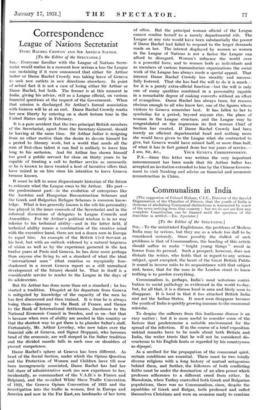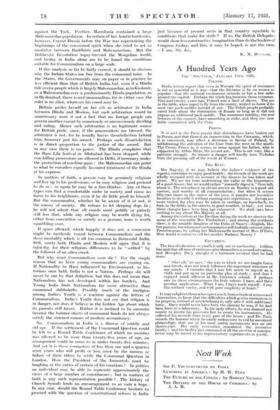Communalism in India
[The suggestion of Colonel Haksar, C.I.E., Director of the Special Organization of the Chamber of Princes, that the youth of India is desirous of abolishing Communal distinctions is warranted by much of the news arriving from that country : but we do not see how any complete Constitution can be framed until the question of the franchise is settled.—En. Spectator.] [To the Editor of the SPECTATOR.] Sm,—To the uninitiated Englishman, the problems of Modern India may be serious, but they are as a whole too dull to bc considered seriously. Since possibly the dullest of such problems is that of Communalism, the heading of this article should suffice to make "bright young things" recoil in horror from its perusal. Such a prospect, however, does not disturb the writer, who holds that in regard to any serious subject, sport excepted, the heart of the Great British Public is sound in inverse ratio to its acquaintance with that subject and, hence, that for the man in the London street to know nothing is to pardon everything.
Communalism is, perhaps, India's most notorious contri- bution to social pathology as evidenced in the world to-day, but, for all that, it is a disease local in area and likely soon to disappear. It is local in that it has attacked British India and not the Indian States. It must soon disappear because the youth of India is quickly growing immune to the communal microbe.
To despise the sufferers from this loathsome disease is an easy matter ; but it is more useful to consider some of the factors that predetermine a suitable environment for the spread of the infection. If in the course of a brief exposition unkind remarks have to be made about both Britain and
India, the writer trusts that he will not be considered dis- courteous to his English hosts or regarded by his countrymen as depayse.
As a seedbed for the propagation of the communal spirit, certain conditions are essential. There must be two totally diverse religions with a long history of mutual antagonism behind them, and further, the followers of both conflicting faiths must be under the domination of an alien power which professes adherence to a different creed from either. In Macedonia, when Turkey controlled both Greek and Bulgarian populations, there was no Communalism, since, despite the squabbles of Greek and Bulgar, both professed and called themselves Christians and were on occasion ready to combine
against the Turk. Further, Macedonia contained a large Mahommedan population. In certain of her Asiatic territories, however, Czarist Russia before the War was experiencing the beginnings of the communal spirit when she tried to act as mediator between Buddhists and Maliotnmedans. But the Bolshevist Revolution topsy-turvied the Mongolian world, and to-day in India alone are to be found the conditions suitable for Communalism on a large scale.
If this analysis so far be fairly correct, it should be obvious why the Indian States are free from the communal taint. In the States, the Governments may on paper or in practice be less efficient than that of British India, but, even if a Hindu rule over a people which is largely Mahommedan, as in Kashmir,
or a Mahommedan over a predominantly Hindu population, as in Hyderabad, there is no Communalism, for in either case the ruler is no alien, whatever his creed may be.
Britain prides herself on her role as arbitrator in India between Hindu and Moslem, but such arbitration would be
unnecessary were it not a fact that no foreign people can govern another except by consciously or unconsciously dividing and ruling. Hence such arbitration is no legitimate source for British pride, since, if the peacemakers are blessed, the arbitrator is not, for he usually leaves dissatisfaction behind him, however just his award. Perhaps such dissatisfaction is in direct proportion to the justice of the award. But in any case there is no peace. The Hindu complains that the Ram Lila festival in Allahabad has been stopped, while cow-killing processions are allowed in Delhi, if necessary under the protection of machine-guns; the Mahommedan can point to what he considers equally favoured treatment of the Hindu at his expense.
In matters of faith, a person may be genuinely religious and live up to his professions, or he may religiose and pretend to do so ; or again he may be a free-thinker. Any of these types can find a comfortable niche in society and cause no harm to his neighbours, even if he do little good to himself.
But the communalist, whether he be aware of it or not, is the enemy of society. He refuses to let sleeping dogs lie ; he will not admit that all creeds must petrify or putrefy still less that, while any religion may be worth dying for, either from conviction or merely as a gesture, none is worth squabbling over.
If space allowed, which happily it does not, a connexion might be tactlessly traced between Communalism and the
slave mentality which is all too common in distressful India. Still, surely both Hindu and Moslem will agree that it is infra dig, for their religious differences to be "settled" by the follower of an alien creed.
But why must Communalism soon die ? For the simple reason that no keen young conununalists are coming on.
If Nationality be Race influenced by Environment, as his- torians once held, India is not a Nation. Perhaps she will never be one by that definition. but this does not mean that Nationalism has not developed within her borders. And Young India finds Nationalism far more attractive than communal shibboleths. Possibly much of the irreligion among India's Youth is a reaction against the fetters of Communalism. India's Youth does not cry that religion is in danger, nor does it believe in the Golden Age about which its parents still haver. Rather it is inclined to be sarcastic because the balance-sheets of communal funds do not always satisfy the strictest canons of modern accountancy.
No. Communalism in India is a disease of middle and old age. If the settlement of the Communal Question could be left to at Round Table Conference of which no member was allowed to be more than twenty-five years of age, an arrangement could be come to in under twenty-five minutes.
And yet it is these youngsters of less than one and a quarter score years who will profit or lose most by the success or failure of their elders to settle the Communal Question in London. How the President of the Immortals must be laughing at the antics of certain of his creations ! In politics an individual may be able to represent approximately the views of a large number of constituents ; but in matters of faith is any such representation possible The history of Church Synods lends no encouragement to so vain a hope. In any case, should the Round Table Conference hesitate to proceed with the question of constitutional reform in India just because at present sects in that country squabble in conditions that make for strife ? If so, the British Delegates would show less constructive imagination than do thef leaders of Congress to-day, and this, it may be hoped, is not the case.
—I am, Sir, &c., K. N. H.ms.ta.





































 Previous page
Previous page